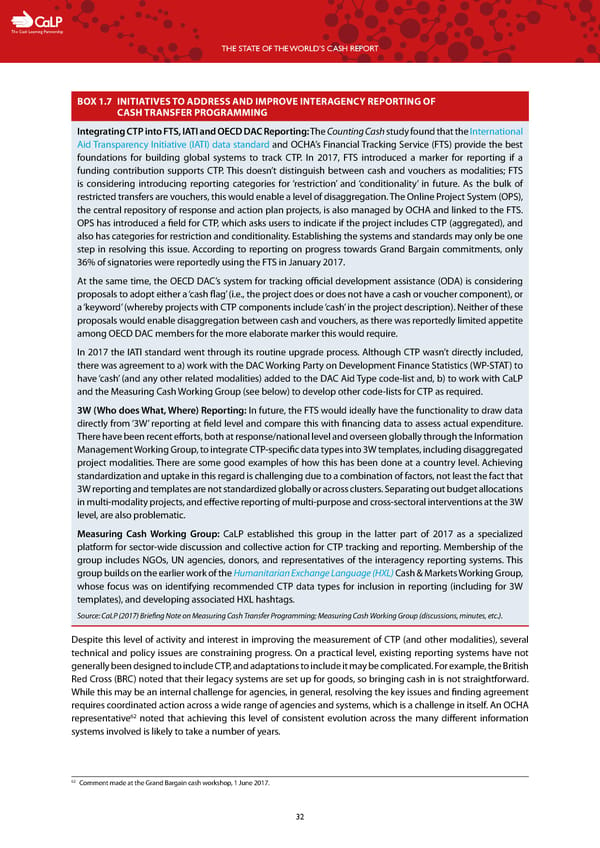C The Cash Learning Partnership THE STATE OF THE WORLD’S CASH REPORT BOX 1.7 INITIATIVES TO ADDRESS AND IMPROVE INTERAGENCY REPORTING OF CASH TRANSFER PROGRAMMING Integrating CTP into FTS, IATI and OECD DAC Reporting: The Counting Cash study found that the International Aid Transparency Initiative (IATI) data standard and OCHA’s Financial Tracking Service (FTS) provide the best foundations for building global systems to track CTP. In 2017, FTS introduced a marker for reporting if a funding contribution supports CTP. This doesn’t distinguish between cash and vouchers as modalities; FTS is considering introducing reporting categories for ‘restriction’ and ‘conditionality’ in future. As the bulk of restricted transfers are vouchers, this would enable a level of disaggregation. The Online Project System (OPS), the central repository of response and action plan projects, is also managed by OCHA and linked to the FTS. OPS has introduced a field for CTP, which asks users to indicate if the project includes CTP (aggregated), and also has categories for restriction and conditionality. Establishing the systems and standards may only be one step in resolving this issue. According to reporting on progress towards Grand Bargain commitments, only 36% of signatories were reportedly using the FTS in January 2017. At the same time, the OECD DAC’s system for tracking official development assistance (ODA) is considering proposals to adopt either a ‘cash flag’ (i.e., the project does or does not have a cash or voucher component), or a ‘keyword’ (whereby projects with CTP components include ‘cash’ in the project description). Neither of these proposals would enable disaggregation between cash and vouchers, as there was reportedly limited appetite among OECD DAC members for the more elaborate marker this would require. In 2017 the IATI standard went through its routine upgrade process. Although CTP wasn’t directly included, there was agreement to a) work with the DAC Working Party on Development Finance Statistics (WP-STAT) to have ‘cash’ (and any other related modalities) added to the DAC Aid Type code-list and, b) to work with CaLP and the Measuring Cash Working Group (see below) to develop other code-lists for CTP as required. 3W (Who does What, Where) Reporting: In future, the FTS would ideally have the functionality to draw data directly from ‘3W’ reporting at field level and compare this with financing data to assess actual expenditure. There have been recent efforts, both at response/national level and overseen globally through the Information Management Working Group, to integrate CTP-specific data types into 3W templates, including disaggregated project modalities. There are some good examples of how this has been done at a country level. Achieving standardization and uptake in this regard is challenging due to a combination of factors, not least the fact that 3W reporting and templates are not standardized globally or across clusters. Separating out budget allocations in multi-modality projects, and effective reporting of multi-purpose and cross-sectoral interventions at the 3W level, are also problematic. Measuring Cash Working Group: CaLP established this group in the latter part of 2017 as a specialized platform for sector-wide discussion and collective action for CTP tracking and reporting. Membership of the group includes NGOs, UN agencies, donors, and representatives of the interagency reporting systems. This group builds on the earlier work of the Humanitarian Exchange Language (HXL) Cash & Markets Working Group, whose focus was on identifying recommended CTP data types for inclusion in reporting (including for 3W templates), and developing associated HXL hashtags. Source: CaLP (2017) Briefing Note on Measuring Cash Transfer Programming; Measuring Cash Working Group (discussions, minutes, etc.). Despite this level of activity and interest in improving the measurement of CTP (and other modalities), several technical and policy issues are constraining progress. On a practical level, existing reporting systems have not generally been designed to include CTP, and adaptations to include it may be complicated. For example, the British Red Cross (BRC) noted that their legacy systems are set up for goods, so bringing cash in is not straightforward. While this may be an internal challenge for agencies, in general, resolving the key issues and finding agreement requires coordinated action across a wide range of agencies and systems, which is a challenge in itself. An OCHA 62 representative noted that achieving this level of consistent evolution across the many different information systems involved is likely to take a number of years. 62 Comment made at the Grand Bargain cash workshop, 1 June 2017. 32
 The State of the World's Cash | Full Report Page 33 Page 35
The State of the World's Cash | Full Report Page 33 Page 35